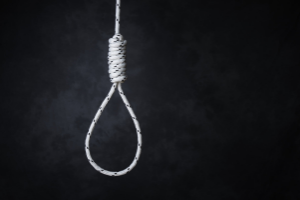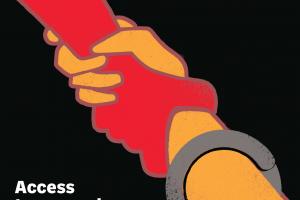20th World Day against the Death Penalty - DEATH PENALTY: A ROAD PAVED WITH TORTURE
In its twenty years of existence, the World Day against the Death Penalty has become a vital occasion to join forces with associations and abolitionist campaigners all round the world to advocate for the abolition of the death penalty in all circumstances, while raising awareness about the various and intersectional issues affecting those sentenced to or impacted by the death penalty around the world.
We therefore reaffirm once again our commitment to universal abolition and echo the World Coalition’s invitation to explore the link between the use of the death penalty and torture or other cruel, inhuman, and degrading treatment or punishment (CIDTP), and the growing number of legal developments that increasingly call into question the compatibility of the death penalty with the international standards and regulations governing the prohibition of torture and CIDTP[1] .
In addition to the immediate and sometimes exceptional pain and suffering that are caused by certain methods of execution -- many of which already have been specifically acknowledged as constituting torture or CIDTP by the Human Rights Committee [2] --, other aspects of the death penalty may well amount to torture or CIDTP in all stages of its application.
At the time of sentencing, criminal convictions resulting in the death penalty that are based on information extracted by physical or psychological torture are contrary to international law, including the prohibition of torture[3]. As previously addressed by the 16th World Day, the death row phenomenon, firmly supported by a rich body of jurisprudence, consists of a combination of circumstances including excessive length of incarceration, stressful and severe prison conditions, and the anguish of living under a death sentence. This phenomenon can lead to long-term psychological and physical deterioration in prisoners pending execution, amounting to torture or CIDTP. The psychological suffering that relatives of those sentenced face and/or the secrecy or the lack of information provided to family or those with a close relationship with the executed on the circumstances of the death of an individual are also a cruel feature of the capital punishment.
“The ability of States to impose the death penalty without violating the prohibition of torture and CIDT is becoming increasingly restricted. Taking this into account, I have called upon all States to consider whether the use of the death penalty, as applied in the real world today, fails to respect the inherent dignity of the human person, causes severe mental and physical pain or suffering, and constitutes a violation of the prohibition of torture or CIDT” .
Juan E. Méndez, former Special Rapporteur on Torture and other cruel, inhuman and degrading treatment or punishment .
We invite you to learn more about the 20th World Day and join the conversation on the link between the use of the death penalty, torture and CIDTP while simultaneously mobilizing to insist on the complete abolition of the death penalty everywhere, in all cases and circumstances.
Today, 110 States have abolished the death penalty for all crimes; 27 States are abolitionists in practice; 7 States have abolished the death penalty for common crimes and 55 States remain retentionists. We will continue to call upon States to join the global trend towards abolition of the death penalty.
And, as every year, we invite UIA members, as well as the international legal community, to support, engage in, and replicate, within and beyond the courts, the efforts undertaken by the abolitionist community around the world.
***
[1] See i.e. Reports of the Special Rapporteurs on torture and other cruel, inhuman or degrading treatment or punishment A/HRC/10/44, 2009, para. 38-40; A/67/279, 2012, para. 53-72.
[2] See Human Rights Committee of the United Nations, General Comment No. 36 - Article 6: right to life, CCPR/C/GC/36, para. 40, September 3, 2019.
[3] Idem, para. 54
[4] Méndez,Juan E. "The Death Penalty and the Absolute Prohibition of Torture and Cruel, Inhuman, and Degrading Treatment or Punishment." Human Rights Brief 20, no. 1 (2012): 2-6.






